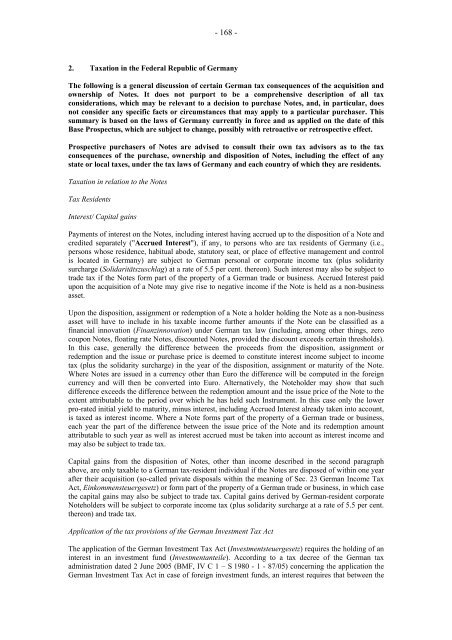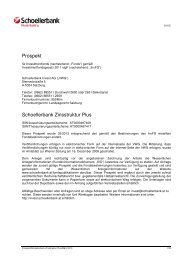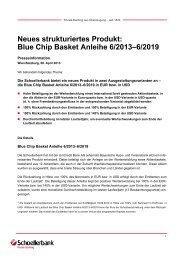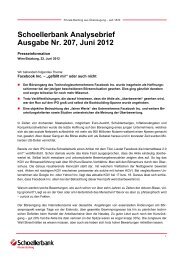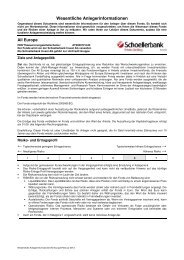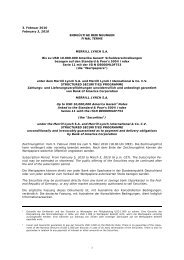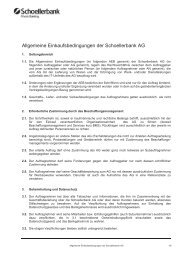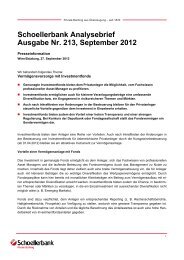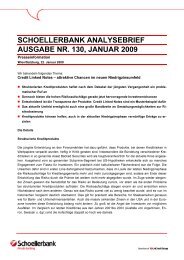Barclays, Base Prospectus 2006
Barclays, Base Prospectus 2006
Barclays, Base Prospectus 2006
Create successful ePaper yourself
Turn your PDF publications into a flip-book with our unique Google optimized e-Paper software.
- 168 -<br />
2. Taxation in the Federal Republic of Germany<br />
The following is a general discussion of certain German tax consequences of the acquisition and<br />
ownership of Notes. It does not purport to be a comprehensive description of all tax<br />
considerations, which may be relevant to a decision to purchase Notes, and, in particular, does<br />
not consider any specific facts or circumstances that may apply to a particular purchaser. This<br />
summary is based on the laws of Germany currently in force and as applied on the date of this<br />
<strong>Base</strong> <strong>Prospectus</strong>, which are subject to change, possibly with retroactive or retrospective effect.<br />
Prospective purchasers of Notes are advised to consult their own tax advisors as to the tax<br />
consequences of the purchase, ownership and disposition of Notes, including the effect of any<br />
state or local taxes, under the tax laws of Germany and each country of which they are residents.<br />
Taxation in relation to the Notes<br />
Tax Residents<br />
Interest/ Capital gains<br />
Payments of interest on the Notes, including interest having accrued up to the disposition of a Note and<br />
credited separately ("Accrued Interest"), if any, to persons who are tax residents of Germany (i.e.,<br />
persons whose residence, habitual abode, statutory seat, or place of effective management and control<br />
is located in Germany) are subject to German personal or corporate income tax (plus solidarity<br />
surcharge (Solidaritätszuschlag) at a rate of 5.5 per cent. thereon). Such interest may also be subject to<br />
trade tax if the Notes form part of the property of a German trade or business. Accrued Interest paid<br />
upon the acquisition of a Note may give rise to negative income if the Note is held as a non-business<br />
asset.<br />
Upon the disposition, assignment or redemption of a Note a holder holding the Note as a non-business<br />
asset will have to include in his taxable income further amounts if the Note can be classified as a<br />
financial innovation (Finanzinnovation) under German tax law (including, among other things, zero<br />
coupon Notes, floating rate Notes, discounted Notes, provided the discount exceeds certain thresholds).<br />
In this case, generally the difference between the proceeds from the disposition, assignment or<br />
redemption and the issue or purchase price is deemed to constitute interest income subject to income<br />
tax (plus the solidarity surcharge) in the year of the disposition, assignment or maturity of the Note.<br />
Where Notes are issued in a currency other than Euro the difference will be computed in the foreign<br />
currency and will then be converted into Euro. Alternatively, the Noteholder may show that such<br />
difference exceeds the difference between the redemption amount and the issue price of the Note to the<br />
extent attributable to the period over which he has held such Instrument. In this case only the lower<br />
pro-rated initial yield to maturity, minus interest, including Accrued Interest already taken into account,<br />
is taxed as interest income. Where a Note forms part of the property of a German trade or business,<br />
each year the part of the difference between the issue price of the Note and its redemption amount<br />
attributable to such year as well as interest accrued must be taken into account as interest income and<br />
may also be subject to trade tax.<br />
Capital gains from the disposition of Notes, other than income described in the second paragraph<br />
above, are only taxable to a German tax-resident individual if the Notes are disposed of within one year<br />
after their acquisition (so-called private disposals within the meaning of Sec. 23 German Income Tax<br />
Act, Einkommensteuergesetz) or form part of the property of a German trade or business, in which case<br />
the capital gains may also be subject to trade tax. Capital gains derived by German-resident corporate<br />
Noteholders will be subject to corporate income tax (plus solidarity surcharge at a rate of 5.5 per cent.<br />
thereon) and trade tax.<br />
Application of the tax provisions of the German Investment Tax Act<br />
The application of the German Investment Tax Act (Investmentsteuergesetz) requires the holding of an<br />
interest in an investment fund (Investmentanteile). According to a tax decree of the German tax<br />
administration dated 2 June 2005 (BMF, IV C 1 – S 1980 - 1 - 87/05) concerning the application the<br />
German Investment Tax Act in case of foreign investment funds, an interest requires that between the


